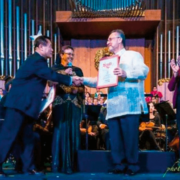Long before a symphonic conductor appears before an audience to impress his qualities on his listeners (who maybe critical or otherwise), he has already made the impression that eventually determines the extent of this success: a complex mix of motivations.
It is not merely his authority, beat or his knowledge of score or willpower — his beautiful hands, exquisite gestures and more pertinently, his magnificent musicianship.
He anticipates the pleasure he expects to derive from his orchestral musicians, who play their superb instruments. These musicians believe that they are in good hands and that they can “make beautiful music together.”
The Maestro bowed gently and beamed broadly. His gestures were grand, as he spread out his arms wide to thank the subdued crowd; he roused musical enchantment in the sold-out crowd, even before he played a note.
He stood out in a chin-up exhortation out front, where the glow is seeking and offering the best performance that surrounds the musical artistic accomplishment of our time. The maestro conducts the orchestra, like a man with a mission; vanishing any cloud of doubt about his ability to continue waving the Philippine flag on top of the musical world not only here in Los Angeles, but in the entire US.
In an interview over coffee at the Beverly Hills Hotels Polo Lounge recently, the conversation flourishes on varied subjects: from his performance since 2008 to up to the present. We spoke mostly about FASO Goes to the Movies.
Mr. Shroder said that talent and timing are the major ingredients of success, in any form of art. He even suspects that timing is more important of the two, for if the audience is not ready for it, talent alone will not be enough.
It is what makes a conductor shudder before an opening — is it too late or too soon? Should it be right now?
But there was the charm of novelty, in the peerless way he conducted Bach to Rock or FASO Goes to the Movies.
He shook the Pasadena auditorium and made it tremble, as hundreds of concert aficionados watched (in indescribable rapture) that veritable geyser of the most wonderful themes from the movies: duets, ensemble and melodies so spontaneous and effervescent. Some were played with fire and abandon, like poets that dazzle.
Where else could we find another musical expression that would portray so many difficult, subtle shades of emotions passing through an entire cauldron of feelings? Tenderness, romance, gaiety, nostalgia, pathos, but above all love of country — solid patriotism that evokes pride, as the Maestro gets more tireless and resilient with his magic baton or flute, in his last six stints conducting a symphony.
The whole ensemble of his performances was not an invitation. — it was stepping into another time, another world as Mr. Shroder transports us into bygone eras when love meant to go out and love: suffer and wound, celebrate loves strength, not complain of its deficiencies. Love Story, Lara’s Theme (inspired by the novel of Nobel laureate Boris Pasternak from West Side Story) described ferocious tension of gang war on a racial basis; it was anything but repellant and frightening.
Leonard Bernstein’s classical ballet of death achieved a most powerful work of art, as it achieved moments of genuine purity.
But Maestro, really what makes a versatile conductor?
“Like a presiding magician his music could be tender and melodic, as well as frenzied and contrapuntal. The musical world would be unbearable if the relentless tension of the score were not relieved from time to time by a simple song…”
This magnificent conductor draws strength from his music — this is his gift to one and all.
If he didn’t play his music, it cannot be imagined.




